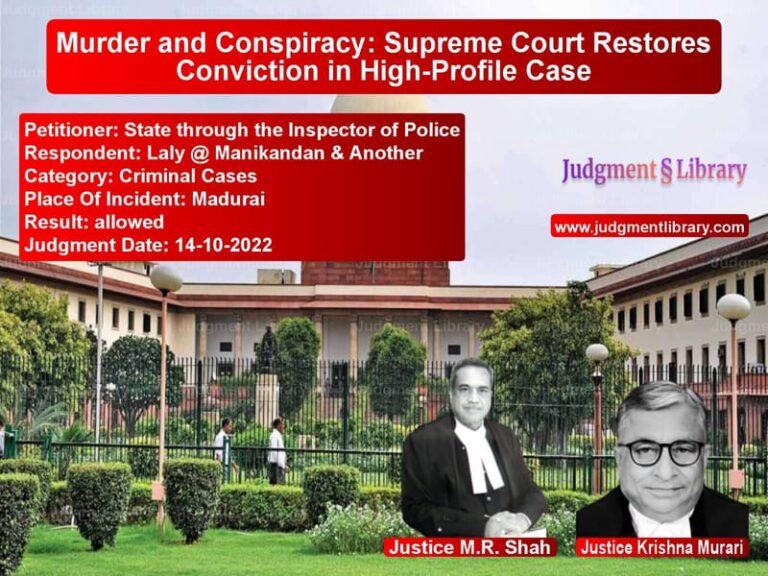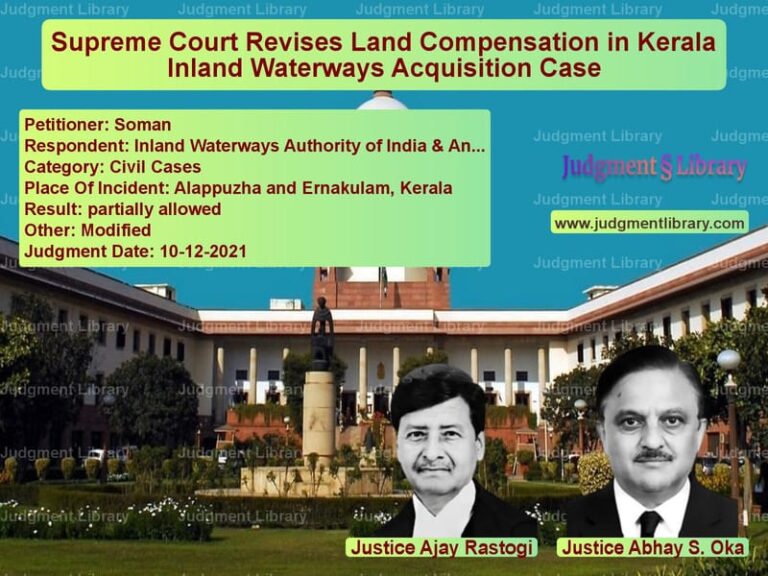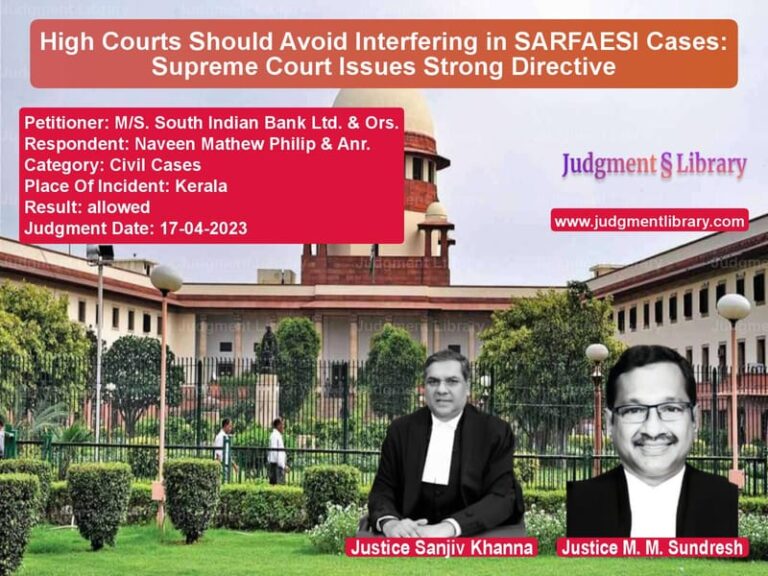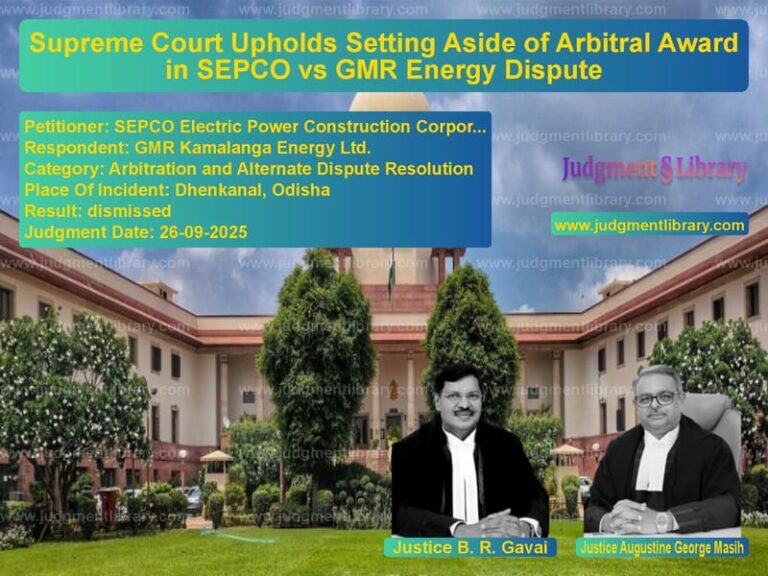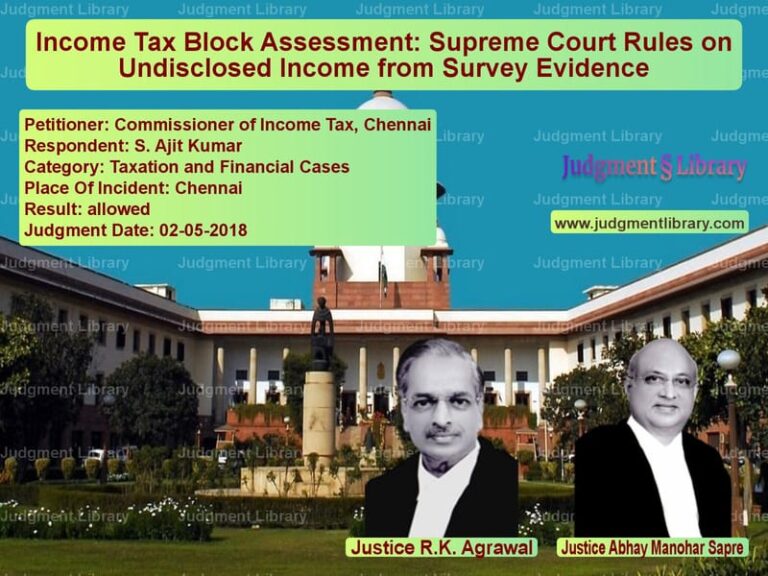Supreme Court Remands Land Partition Dispute for Fresh Trial
The case of Selvi vs. Gopalakrishnan Nair & Others revolves around a decades-long land partition dispute in Tamil Nadu. The Supreme Court was tasked with determining the rightful ownership and partitioning of a mortgaged property that had been the subject of litigation for over five decades. The key issue in the case was whether Survey No.988, which was claimed by the second defendant, should be excluded from the suit property.
Background of the Case
The disputed properties belonged to Kali Pillai, Krishna Pillai, and others. On August 11, 1913, these individuals mortgaged the properties to Kutti Bhagvathi for Rs. 785 (equivalent to Rs. 109.04 today). Over the years, the mortgage rights were transferred multiple times:
- First Assignment: From Kutti Bhagvathi to Eravi Pillai Parvathi Pillai.
- Second Assignment: To Parameswaran Pillai.
- Sub-Mortgage: A portion of the land was further mortgaged to Kesava Pillai Narayana Pillai, which later became vested with the second defendant, Gopalakrishnan Nair.
The legal heirs of the original mortgagors, including Kalyani Pillai (the first plaintiff), sought to redeem the mortgage and reclaim possession of the property.
Trial Court and High Court Rulings
The trial court issued a preliminary decree on August 7, 1976, holding that the plaintiffs had the right to redeem and recover 7.40 acres from defendants 1 to 4 by depositing Rs. 109.81 as mortgage money. A final decree was passed in 2001, confirming the partition.
However, the second defendant, Gopalakrishnan Nair, appealed, claiming ownership of Survey No.988. He contended that this portion of land was wrongly included in the decree. The Madras High Court (Madurai Bench) ruled in his favor, holding that the plaintiffs could not claim Survey No.988.
Arguments by the Appellant (Selvi)
The appellant, Selvi, who had acquired rights through multiple transactions, argued that:
- The trial court’s decree rightfully included Survey No.988 within the suit property.
- The defendant had failed to appeal against the preliminary decree in 1976, barring him from challenging it in the final decree proceedings.
- The trial court had already rejected the defendant’s objections regarding Survey No.988.
Arguments by the Respondent (Gopalakrishnan Nair)
The respondent, Gopalakrishnan Nair, contended:
- Survey No.988 belonged to him and was wrongly included in the suit.
- The property was excluded from partition by an order dated April 27, 1998, and should not have been considered in the final decree.
- The plaintiffs’ documents failed to establish ownership over Survey No.988.
Supreme Court’s Observations
The Supreme Court, comprising Justice R. Banumathi and Justice L. Nageswara Rao, found that the lower courts had overlooked crucial evidence regarding the boundaries and ownership of Survey No.988. The Court ruled:
1. Defendant’s Ownership Claim Should Have Been Examined
The Court observed that the trial court did not thoroughly investigate the ownership claim of Survey No.988. It stated:
“The trial court ought to have directed the parties to adduce evidence to ascertain the truth as to the correct description of the suit property and the right claimed by the second defendant in Survey No.988.”
2. Exclusion of Survey No.988 Was Premature
The Court noted that the High Court’s exclusion of Survey No.988 from the decree was based on insufficient evidence. It directed the trial court to verify whether Survey No.988 was part of the mortgaged property.
3. Clarification on Plaintiff’s Rights
The Court also addressed a dispute regarding the plaintiff’s title transfer:
- Kalyani Pillai sold her rights to Vasudevan Pillai on December 27, 1968.
- Vasudevan Pillai assigned his rights to Rajayyan on August 5, 1978.
- Rajayyan transferred them to Selvi on March 10, 1983.
The Court ruled that Selvi’s title was valid and rejected Vasudevan Pillai’s later claim that the transactions were fraudulent.
Final Judgment
The Supreme Court ruled:
- The High Court’s judgment was set aside.
- The case was remanded to the trial court for reconsideration.
- The trial court must determine whether Survey No.988 was part of the mortgaged property.
- The parties were directed to present additional evidence regarding the disputed boundaries.
The Court concluded:
“Since parties are litigating for more than five decades, we direct the trial court to expedite the hearing in the final decree proceedings and dispose of the matter in accordance with law.”
Implications of the Judgment
This ruling has several important implications:
- Ensures Fairness in Land Partition Cases: The decision reinforces that ownership claims must be thoroughly examined before exclusion from partition decrees.
- Protects Rights of Successive Title Holders: The Court upheld the rights of those who acquired ownership through valid legal transfers.
- Emphasizes Proper Boundary Identification: The ruling highlights the importance of verifying land survey numbers to prevent wrongful claims.
This case sets an important precedent in land partition disputes and emphasizes the importance of thorough judicial examination before altering property ownership decisions.
Petitioner Name: Selvi.Respondent Name: Gopalakrishnan Nair & Others.Judgment By: Justice R. Banumathi, Justice L. Nageswara Rao.Place Of Incident: Tamil Nadu.Judgment Date: 15-05-2018.
Don’t miss out on the full details! Download the complete judgment in PDF format below and gain valuable insights instantly!
Download Judgment: Selvi vs Gopalakrishnan Nair Supreme Court of India Judgment Dated 15-05-2018.pdf
Direct Downlaod Judgment: Direct downlaod this Judgment
See all petitions in Property Disputes
See all petitions in Succession and Wills
See all petitions in Landlord-Tenant Disputes
See all petitions in Judgment by R. Banumathi
See all petitions in Judgment by L. Nageswara Rao
See all petitions in Remanded
See all petitions in supreme court of India judgments May 2018
See all petitions in 2018 judgments
See all posts in Civil Cases Category
See all allowed petitions in Civil Cases Category
See all Dismissed petitions in Civil Cases Category
See all partially allowed petitions in Civil Cases Category


